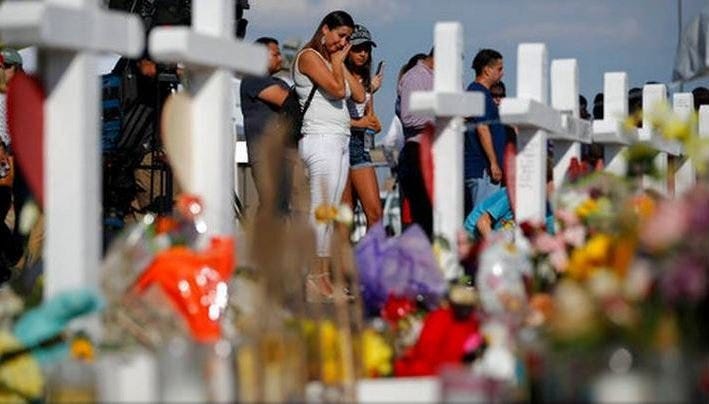On Loving Your Enemies
The Buffalo shooter will spend the rest of his pathetic life in prison. And yet, we are called to love him.

This was originally a weekly pastoral column for my congregation.
A few years ago after a tragic event, I thought the Christian call to love seemed unrealistic. A friend responded, talking about the importance of loving each other.
I wonder how my friend is feeling now after two mass shootings over the weekend.
We all know what happened on Saturday. An 18-year-old gunman went into a grocery store in Buffalo, NY and shot 13 people. Most of those people were black. The shooter had taken in a lot of racist beliefs on the internet and drove a number of hours from his home to Buffalo to kill 10 people. He was even planning on another attack after the supermarket. All of this was fueled by a racist belief in the Great Replacement Theory, a belief that white people will be replaced by blacks, immigrants and Jews.
He continued to spew racial rhetoric after his arrest. At least on the surface, this guy is a hardcore racist who is evil. He will spend the rest of his pathetic life in prison.
And yet, we are called to love him.
In the Sermon on the Mount found in Matthew 5-7, Jesus calls on the crowd to do the opposite of what the world or wider culture calls us to do. “You have heard that it was said, Jesus says, “‘You shall love your neighbor and hate your enemy.’ But I say to you: Love your enemies and pray for those who persecute you.” We like to look at this passage with starry eyes and talk about how we need to love each other. But what if the other is a hardcore bigot? What if he is not just a bigot, but a mass murderer? There isn’t a loophole on this matter.
Jesus can call us to do things that just don’t seem offensive, but are offensive. Forgive a racist murderer? It’s pretty disgusting to be called to do what Jesus asks and yet this is what the Savior call us to do.
In his 1957 sermon called “Love Your Enemies,” Martin Luther King explains the three different kinds of love: eros, love of intimates, philio, brotherly love and the final one, agape. It is this love, King says that Jesus talks about:
The Greek language comes out with another word for love. It is the word agape. And agape is more than eros; agapeis more than philia; agape is something of the understanding, creative, redemptive goodwill for all men. It is a love that seeks nothing in return. It is an overflowing love; it’s what theologians would call the love of God working in the lives of men. And when you rise to love on this level, you begin to love men, not because they are likeable, but because God loves them. You look at every man, and you love him because you know God loves him. And he might be the worst person you’ve ever seen.
King then talks about an experience he had with his brother as they traveled down a highway at night:
I think I mentioned before that sometime ago my brother and I were driving one evening to Chattanooga, Tennessee, from Atlanta. He was driving the car. And for some reason the drivers were very discourteous that night. They didn’t dim their lights; hardly any driver that passed by dimmed his lights. And I remember very vividly, my brother A. D. looked over and in a tone of anger said: “I know what I’m going to do. The next car that comes along here and refuses to dim the lights, I’m going to fail to dim mine and pour them on in all of their power.” And I looked at him right quick and said: “Oh no, don’t do that. There’d be too much light on this highway, and it will end up in mutual destruction for all. Somebody got to have some sense on this highway.”
Dim the lights. That’s what Jesus is calling us to do.
Loving the enemy doesn’t mean having fond feelings for the person. It most certainly doesn’t mean excusing evil. But it does mean that we look at this person, as evil and reprehensible as they are, bears the image of God.
“I give you a new commandment, that you love one another. Just as I have loved you, you also should love one another. By this everyone will know that you are my disciples, if you have love for one another.”
I preached on this passage from John 13 this last Sunday. Loving our enemies is a way that we show we are followers of the one who forgave his killers from the cross. When the relatives of those killed in Charleston, South Carolina in 2015 by another young racist man, forgave the killer, no one said he had to be spared from justice. Loving our enemies is costly, but it doesn’t let the enemy off the hook.
America is heading into some challenging times. Fring racist theories like the great replacement theory are becoming mainstream. We might be seeing more Buffalos in the future.
So let us ask God for the strength to love our enemies and pray for the persecutors. Let us pray for the racists such as this shooter and pray for their redemption. That isn’t easy to do. It is offensive. But it is the God who loves even the unlovable that calls us to do this. If God can love, God can help us to love as well.
“We must love one another or die,” says W.H. Auden in his poem, September 1, 1939. Evil people like the shooter want to destroy. Let us respond in the power of God to love the racists, and the haters and the like. Let’s dim the lights.



